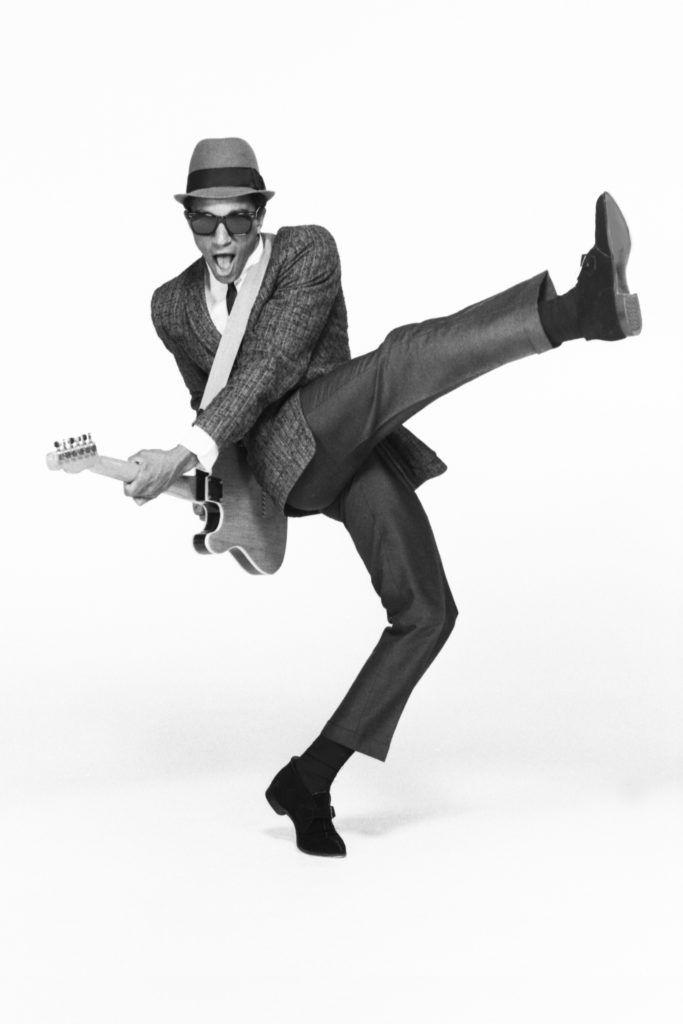I was introduced to ska music—the danceable and joyous music of 60s Jamaica—by hearing The Specials’ very first self-titled album. The Specials and its 2 Tone label were responsible for a look and sound that was all the rage in England in the late 70s and early 80s and made its way over to the U.S. That Specials album opened the door to the amazing world of ska and reggae music and inspired me to pick up a bass guitar and learn how to play it. I was one of the many Gen Xers who got the ska bug and it inspired me to start the first ska band in New Jersey in 1988 called Bigger Thomas. But I wasn’t the only one. There were others in cities big and small across the U.S. who had similar experiences. My book Ska Boom: An American Ska & Reggae Oral History is the result of the love and passion I have for music. I spent three and a half years researching, writing, and documenting the earliest days of American ska and reggae from the late 1970s through the early 1990s.
The Original Ska Boom Happened In the 80s
In nineteen chapters across nearly 400 pages, I’ve knitted together the origin stories of the young musical pioneers who helped create a uniquely American version of ska and reggae. These bands were formed and toured before the advent of the Internet and smartphones, so there is very little known about them and the important role they played in creating an American ska sub-culture. The fact is that ska and reggae music and the ska community that had such a huge impact on me and made me who I am today also helped transform the lives of many other musicians. The truth is that without the hard work and dedication of the bands featured in the book there would not be a thriving 21st-century American ska and ska-punk scene.
Clyde Grimes is an Unsung American Ska Icon
There is a specific reason I chose to have a picture of Clyde Grimes, guitarist for Los Angeles mod ska band The Untouchables, on the cover of the book. Many of the musicians I interviewed name-checked Clyde and looked up to him, including Greg Lee, vocalist for Hepcat who reminisced about meeting Clyde for the first time on Melrose Avenue while hanging out with mods—a sub-culture of music fans who rode scooters, loved dancing to ska, reggae and soul music and worshipped the movie Quadrophenia. Greg told me, “Clyde Grimes was one of us.”

Clyde Grimes Influences a Generation of Bands
Clyde was an accessible ambassador for the ska mod movement in Southern California and once The Untouchables signed to the iconic Stiff Records in England in the mid-80s, he was suddenly known around the world. Clyde had style for miles, could really shred on the guitar, and he wrote the band’s biggest hit “Free Yourself”, which aired on MTV and won a Billboard Magazine award for best independent video in 1984. More importantly, Clyde and The Untouchables also influenced and inspired many well-known American ska boom era bands who came after them and enjoyed significant success including Fishbone, No Doubt, and Sublime. Fishbone bassist Norwood Fisher said that the influence of Clyde and the band were immense, telling me, “There’s a little bit of Clyde Grimes of The Untouchables in all of us in Fishbone.”
A Picture Paints a Thousand Words
Personally, I think the picture of Clyde is one of the most iconic American rock photos of all time. Used for promo around the band’s Live and Let Dance LP released in 1984, the picture of Clyde, taken by noted rock music photographer Frank Gargani, captures the energy and excitement of a uniquely American version of ska music that developed in the early 80s that’s documented in the book. Clyde was such a natural in front of the camera, and Gargani got the shot he needed after taking just a few photos.
An Important Musical Legacy
The photo of Clyde is also an important reminder that the original American ska bands and ska scenes of the 80s – symbolized by the leaping photo of Clyde – were created by multi-racial groups of young musicians in Boston, New York, Chicago, Detroit, San Francisco, Los Angeles and many places in between, who embraced the look, sound, and ideals of 2 Tone. And in doing so, helped to give birth to a uniquely American version of ska that would emerge in the mid and late 90s. The truth is that without Bim Skala Bim from Boston, there are no Mighty Mighty Bosstones. Without The Uptones from Berkeley, CA., there is no Rancid. Without The Untouchables from Southern California, there is no Reel Big Fish or No Doubt. And without The Toasters from New York, there is no Bigger Thomas from New Jersey.
Marc Wasserman has devoted most of his life to his love and passion for ska and reggae music. Discovering the vibrant New York City ska scene of the mid-80s that was then in full gear, convinced him to pick up the bass and start his own band Bigger Thomas – the first ska band from New Jersey in 1988. As such he had a front-row seat for the ska boom that exploded across the US in the late 80s and early 90s.
Ska Boom! is Marc’s first book and took 3 ½ years to research and write, and included interviews with hundreds of musicians, band managers, club promoters, fans, and music industry veterans. The book features nineteen chapters on eighteen key American bands – including The Toasters, Bim Skala Bim, Mephiskapheles, The Untouchables, and many more– and one coast-to-coast US tour in 1993 that helped give birth to a uniquely American version of ska and reggae.